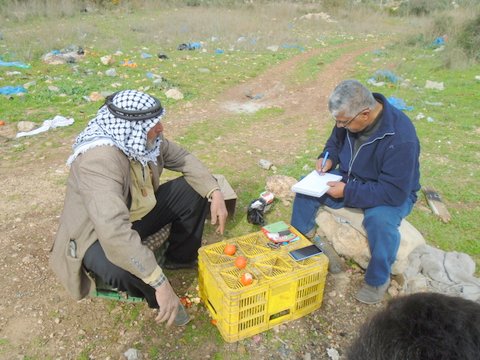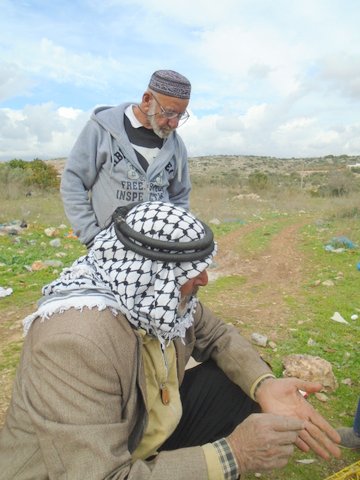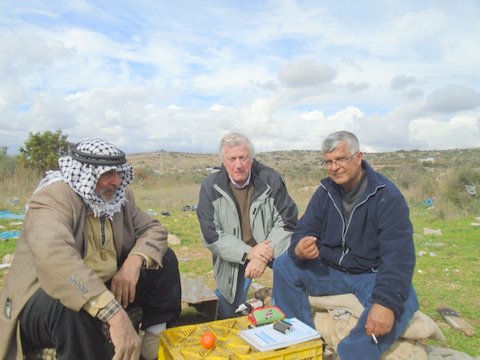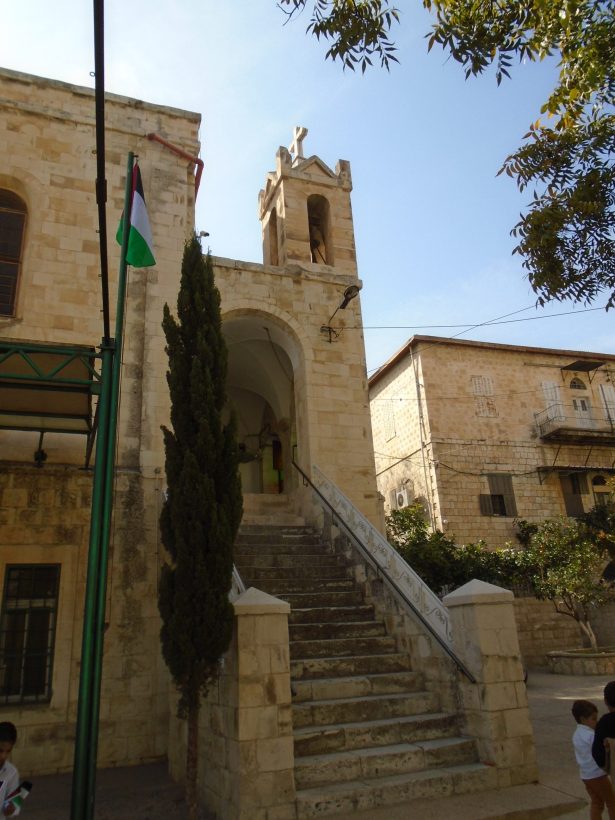
Last week I spend the day with Abdulkarim Sadi, who works with B’Tselem, an Israeli human rights organization, that seeks to change Israeli policy in the Occupied Territories and ensure that the Israeli government protects the human rights of residents there and complies with its obligations under international law.
It was a full day. I met him at the automobile checkpoint near to Tulkarm and that in itself was a little bit hit-and-miss.
At first I thought that he was on the Israeli side of the checkpoint and when I tried to go through the checkpoint the soldier told me I could only go through in a car. So I said fine, I will see if someone will take me in the next car that comes along. The soldier helped me to slow down a car – I open the back door to get in – in fact I threw my backpack in first – but the driver went ‘bezerk’ and absolutely refused to let me into his car.
I’m not surprised really – why would anyone think of taking a total stranger with a backpack in a car through an Israeli checkpoint, entering Israel from the West Bank.
Think about it!
Anyway following that near misadventure, Sadi and I drove to Qualqiliya where he met with the owner of a fruit stand which had recently been demolished by the Israeli military. His purpose was to document this event.
We met the man who was a former teacher – he was a distinguished-looking man dressed in traditional Arabic Style.

His hands were weather-worn and tired looking and his grandson was with him. They were sitting around an open fire in the field near where the fruit stand had been.
The week before the demolition, the IDF soldiers had arrived in Jeeps and issued a demolition order. They put the order on the ground in front of the fruit stand put a stone on top of it to keep it from blowing away, and took a photograph.

The owner did not think much of this, as demolition orders are issued on a regular basis for all kinds of structures: homes, animal shelters, fruit stands, water pipes and many other structures and installations, but they are seldom acted on without a second warning.
Exactly a week later, the Jeeps and the bulldozer arrived. First, they packed 70 boxes of fruits and vegetables into a truck and gave the man a receipt for those. Next, they proceeded to demolish the stand and smash everything to bits – fridges ,counters, tables crates etc.

The man’s grandson took a video of the demolition on his smartphone.
Abdulkarim Sadi took down the information, as the man told the story. He filled five pages of notes and took photographs he also recorded the man’s voice and part of the story. He then asked the man to sign the statement that he had written and he also got the grandson to send him the video of the demolition.

Now this was a really impressive piece of technology. Abdulkarim setup a hotspot on his cell phone so that the boy had internet access, and then the boy sent the video to Abdulkarim using “WhatsApp”. Here, in the middle of a field, it worked perfectly.
And what of the fruit stand owner?
The man, who is a retired teacher, has no other form of income. At the time he was a teacher there was no pension scheme and this fruit stand was providing him with much-needed income.

There were tears in the man’s eyes as he told the story. He rents this piece of land at this location because it was a good location for a fruit stand along the main road. He did not have a license or permit.
This location is in Area C *and no license would ever be granted.
So he now this retired teacher has lost his fruit stand and his fruit and his income – where is the justice?
There is no justice.
MAE/

More about Area C
Area C covers 60% of the West Bank and is home to an estimated 180,000-300,000 Palestinians. It also has a settler population of at least 325,500 living in 125 settlements and approx. 100 outposts.
These are the settlements, deemed illegal by the UN and the international community under the fourth Geneva Convention which prohibits countries from moving populations into territories occupied in a war.
Israel retains control of security and land-management in Area C and views the area as there to serve its own needs, such as military training, economic interests and settlement development.
Despite the large Palestinian population, Israel practically bans Palestinian construction and development. At the same time, it encourages the development of Israeli settlements through a parallel planning mechanism, and the Civil Administration turns a blind eye to settlers’ building violations.




 olds for the Palestinian people. Most of the presentations were in Arabic with simultaneous translation. The Highlight for me was the first session with Gideon Levy a prominent Israeli journalist and writer in which he explained what shapes the thinking and the current attitudes of mainstream Israelis towards Palestinians and why the current situation is likely to continue unchanged for a long time.
olds for the Palestinian people. Most of the presentations were in Arabic with simultaneous translation. The Highlight for me was the first session with Gideon Levy a prominent Israeli journalist and writer in which he explained what shapes the thinking and the current attitudes of mainstream Israelis towards Palestinians and why the current situation is likely to continue unchanged for a long time.









 The art rooms Wow ! – they were beautiful – there was an abundance of art materials available and some of the renditions by the students were truly impressive including the copy of the ‘sunflowers’ sunflowers by Van Gogh! (a student with a possible future in copying grandmasters !?).
The art rooms Wow ! – they were beautiful – there was an abundance of art materials available and some of the renditions by the students were truly impressive including the copy of the ‘sunflowers’ sunflowers by Van Gogh! (a student with a possible future in copying grandmasters !?).









You must be logged in to post a comment.